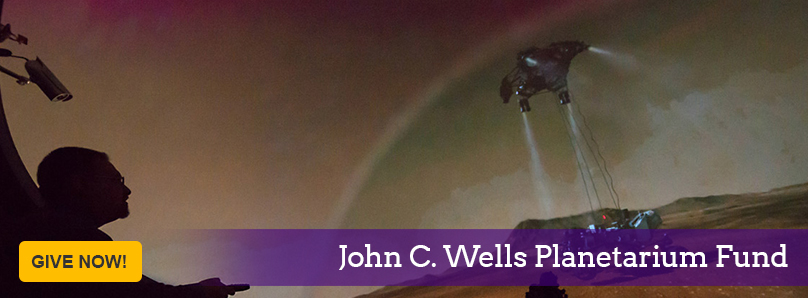Untether young intellects from their earth-bound perspectives. Open their eyes to the vast possibilities of our world and their future in it.
By financially supporting JMU’s John C. Wells Planetarium, you can help engage future astronomers, educators, engineers, mathematicians, physicists and other yearning minds in a “total-immersion-space-experience” that is available at only three other planetaria in the United States.
And it’s right here in the Shenandoah Valley of Virginia, which means local schoolchildren don’t have to travel two hours or more to a metropolitan center to see the world open up to them. That’s what John C. Wells had in mind in 1950 when he founded the planetarium.
"Our state-of-the-art technology allows us to project an authentic view of what the night sky would look like on any given day at any given location on the earth," says professor Shanil Virani. The GOTO Chronos star ball and Digistar 3 projection system provide captivating effects and advanced teaching tools. "I bring up the star ball with full light pollution, for instance, and people recognize the familiar constellations as what they're used to seeing," the JMU physics and astronomy professor explains. "When we remove the light pollution, that's the first 'ooh, ah' moment. Every time."
Virani—2013 NASA/Jet Propulsion Laboratory Solar System Ambassador—knows these are the kinds of engaging youth and undergraduate experiences it will take to revitalize America’s culture of innovation and discovery.
And it will happen child by child. Not only do they attend shows, but JMU students learning to be elementary and middle school science teachers spend 100 hours in the Wells Planetarium operating the programs, leading star talks and teaching school groups and their teachers all about the sky, astronomy and physics.
Your gift to the John C. Wells Planetarium help to:
- Attract top Madison undergraduate physics and astronomy students
- Give future science teachers the experience they need
- Engage Madison undergraduates in community outreach
- Offer planetarium internships for Madison undergraduates
- Add new educational programs and new dome shows to the offerings
- Maintain and replace equipment
- Meet pent-up community demand for the planetarium’s free weekly programs, 20 full-dome shows, star talks and special field trips—all of which fill to capacity
- Subsidize a vital brand new (and already oversubscribed) Summer Astronomy Camp—including scholarships—for students in grades 4-9
Together, by combining our talents and vision at the John C. Wells Planetarium, we can ensure that both local students and JMU students have the opportunity to participate in a vigorous culture of innovation and discovery. That’s how the national model of the Engaged University operates. Please give.

